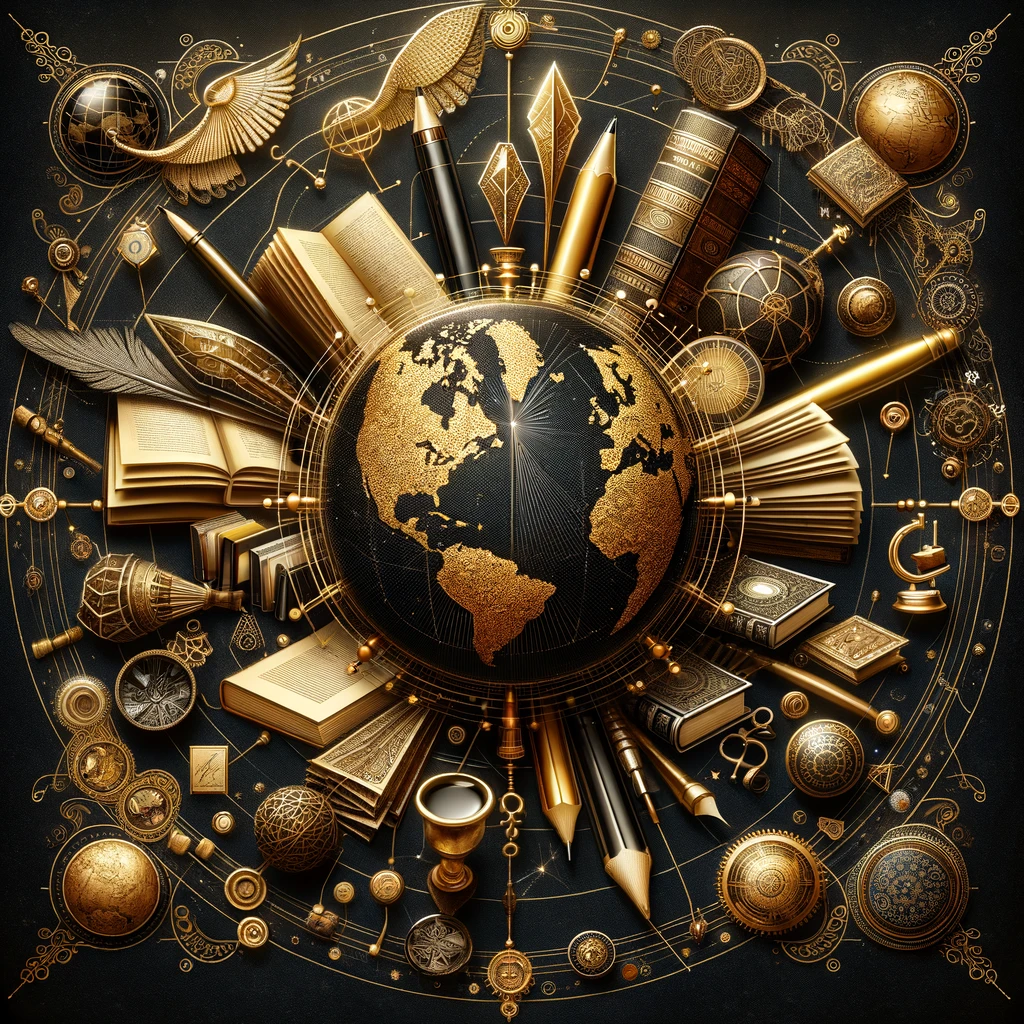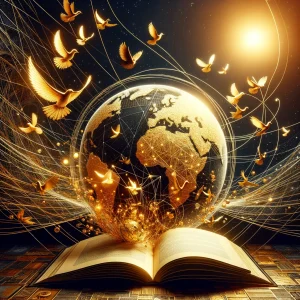by Andrea Albright

Understanding the Global Reach of Book Publishing and Cultural Exchange
Book publishing has long been regarded as an influential industry with immense power to shape cultural exchange on a truly global scale. Through the widespread dissemination of literature, ideas, and knowledge across borders, book publishing connects people from remarkably diverse backgrounds and allows us to gain profound insights into cultures, perspectives, and ways of thinking that may be entirely foreign to our own. In this blog post, we will take an in-depth look at the phenomenal global impact of book publishing, its pivotal role in facilitating cross-cultural dialogues and exchange, and how it manages to transcend creed, race, geography, and time to bind together humanity in our shared joy of stories.
The Universality of Good Literature
What makes good literature so universal in its appeal? No matter where we may have been born on this planet, quality writing has an incredible capacity to speak to our common humanity by conveying universal themes, emotions and life experiences that resonate across cultures. When we read a translated work by a Chinese author, we instantly connect with that writer and gain at least a partial insider’s perspective by effectively looking through their eyes. The same is true when a Chinese reader picks up a work translated from English, Spanish, Swahili, or any other language. Literature translates human experience in ways that passionate readers everywhere can relate to.
Beyond Borders: Accessing World Perspectives Through Global Publishing
With lightning advancements in technology, internet connectivity, and print and e-book production, book publishing now reaches every remote corner of the world with unprecedented speed and efficiency. Writers and readerships have become more globally intertwined than ever before. Through the magic of modern translation services, celebrated works in their original languages are promptly converted into dozens of tongues, mass-produced, and rushed across oceans to enthusiast readers who often pay top dollar to receive newly released translations the day they launch.
For the curious-minded reader, global book publishing offers the intoxicating opportunity to look through an endless number of diverse windows into foreign societies, cultures, customs, struggles, triumphs, histories, and ways of life that would otherwise remain beyond our grasp. We journey into the past through meticulously researched historical non-fiction and rediscover entire civilizations that had faded from memory. An eye-opening memoir allows us to walk in another person’s shoes, while a dramatized tale of romance or survival against all odds sweeps us into exotic lands where we grow to care deeply for people we could never have imagined existed.
Amplifying Marginalized Voices Through Publishing
Too often, the narratives of oppressed, impoverished, and marginalized communities go unheard by the wider world, especially in nations where censorship is rigorously enforced by the ruling regime. Global publishing helps combat this by offering an international platform to authors who shine a light on outlawed, controversial social issues in their home countries. Once translated editions of their works are released worldwide, the stories of those struggling people are much harder to ignore and suppress.
Powerful literature gives voice to the voiceless. It lends strength to the downtrodden and offers hope to those fighting what seems like losing battles. By courageously addressing topics like racism, sexism, and homophobia that remain uncomfortably taboo in certain societies, publishing pushes the human race inch by inch toward greater understanding, compassion, and social justice reform.
Tearing Down Walls: The Exchange of Culture and Perspective
There is no question that books have an immense capacity to tear down psychological, ideological, and cultural barriers that divide humanity against itself. As enlightening works make their way around the world into the hands of open-minded readers, fictional tales allow us to intimately connect with people whose skin colors, religious beliefs, sexual orientations, and political views may be radically different from our own.
Non-fiction offers an even deeper analysis of hot-button social issues from opposing sides. The reader gains not only facts and statistics, but the beating heart of emotional arguments as presented by real people. This facilitates far richer dialogues on subjects like gender equality, immigration reform, Indigenous rights, poverty, and war. Diverse personal perspectives breathe life into theoretical debates about ethical treatment, discrimination, human rights violations, and whether lasting reconciliation between conflicting groups can ever be achieved.
Even in nations where censorship limits access to books and ideas deemed controversial by the state, a thirst for banned literature allows it to quietly spread from reader to reader. Though the progress is often grindingly slow, books change attitudes over generations. Periods of conflict between cultures give way to trade relationships, then political alliances, and eventually acceptance, cooperation, and even integration on issues like women’s suffrage, gay rights, and racial equality. The ultimate triumph of human decency over bigotry can, in large part, be laid at the feet of publishing.
Building Bridges Between Cultures
Publishing serves as a bridge builder, facilitating respectful dialogues to span wide cultural gulfs. Great books do more than inform readers about foreign societies – they directly transport us inside them to immerse us in unique atmospheres, customs, foods, personalities, and challenges.
As books pass into the hands of eager readers across continents, potent stories transcend the barriers of language, geography, politics and religion. Common ground is discovered. Stereotypes dissolve. Readers in Quebec, Cairo, Moscow, Mumbai, Perth, and Sacramento all ache over the same tragic twists. They celebrate victories, swoon over romances, and laugh together at quirky moments of cultural comedy sketched by authors with insider perspectives.
Literary festivals, book fairs, author conferences, reader cruises, and international book tours bring devotees of the written word into joyful communion. We flock to hear our literary heroes speak not only wisdom but wit and humor that leaves sides aching with mirth. In an internet-obsessed world where solitary people too often feel disconnected, books are the social glue binding far-flung book lovers through our shared passion.
The Nuanced Art of Translation
None of this incredible linking of minds across continents would occur without the delicate art of translation. The linguistic alchemists who undertake such work bear great responsibility. Mere word-for-word conversion from one vocabulary to another cannot capture embedded cultural symbols, clever witticisms, and linguistic rhythms crafted by talented writers. True bilingual translation demands complete fluency in both tongues so the translator grasps subtle references that would zip past less qualified interpreters.
Skilled literary translation preserves the original author’s unique voice, regional dialects, political/historical contexts, and cultural flavor while wonderfully rendering them accessible to foreign readers. It weaves an invisible bridge over the void between experiences so readers might enter alien worlds to discover just how much alike we are.
Great translated works should retain the capacity to make us laugh, weep, shiver with dread, scream in rage, and ache with tenderness just as intensely as readers holding original editions. We transcend language itself to immerse ourselves together in the realm of raw human experience captured on printed pages. For devoted bibliophiles, incredible literature exercises the magical power to shrink a giant planet down to the size of a cozy neighborhood inhabited by friends.

Preserving Cultural Heritage through Indigenous Publication
Beyond facilitating contemporary cultural exchange, global publication often plays a profound role in preserving the literary heritage of diverse societies. Too many localized oral languages have already gone extinct over mere decades without ever having been recorded in print or digital archives. Publishing rescues ancient stories, myths, songs, and poems from the abyss of history so they continue enlightening future generations.
Without translation, much-beloved literature would remain trapped inside linguistic cages, inaccessible to outsiders. Instead, skillful rendering of indigenous works allows global readers to appreciate unique facets of dying cultures. Publication offers endangered languages an enduring home, granting their linguistic beauty and cultural treasures the potential for immortality.
Threats to Diversity Posed by Global Publishing
It would be disingenuous to claim that globalized publishing offers only rainbows and butterflies. Dominant cultures inevitably end up overshadowing minority voices, especially when profit-hungry publishers fear that works from less prominent languages will never sell enough copies to justify mass printing. English, which has become something of a literary lingua franca, too often drowns out unique ethnic voices.
The unfortunate homogenization of global literature threatens cultural diversity when publishers skew towards pandering to wider audiences. They tend to favor manuscripts adhering to popular storytelling formulas over daring literary innovation or niche perspectives that seem less commercially viable. This effect continues snowballing once any single culture gains enough dominance in global media to start heavily influencing creative styles and trends across borders.
Protecting Diverse Voices
Thankfully, opportunities abound for organizations, bloggers, podcasters, book reviewers, and everyday readers to boost signals for talented ethnic voices that too rarely pierce background noise. We can intentionally seek out fresh translated works and indigenous authors whose unique perspectives intrigue us. Diversifying our reading diets opens doors to astonishing realities beyond our daily bubbles. Determined readers can foster dialogue across aisles radically separated by politics, ethnicity, and creed.
Rather than permitting an increasingly interconnected world to trample diverse cultures, ethical publishers and devoted readers must stand in defense of voices that offer singular wisdom. There exist shining opportunities to leverage streaming platforms, eReaders, print-on-demand technology, and innovative social media to uplift excluded authors. Doing so enriches the entire literary ecosystem.
When we actively celebrate multiculturalism, literature regains teeth to combat xenophobia and cultural homogenization. Books preserve the threatened heritage of oppressed peoples. Storytelling once again binds humanity together in our shared love for fetching phrases and timeless tales that speak intimately to souls.
In Conclusion
There can be no doubt; that global book publishing represents one of the most powerful positive forces the world has ever known. Literature enables intimate connection across chasms of politics, ethnicity, language, distance, and time. Stories bridge cultures. Turning pages transports. Translated prose and poetry preserve disappearing heritage while stunning diverse voices spark glimpses into realities far beyond our daily existence. Books bind together humanity. And quality writing forever transcends.















































































